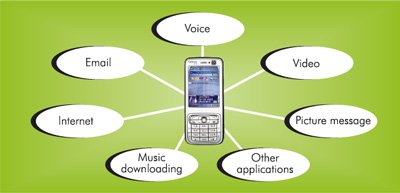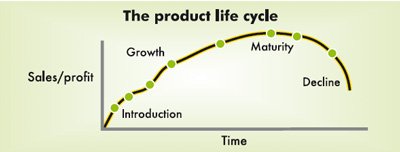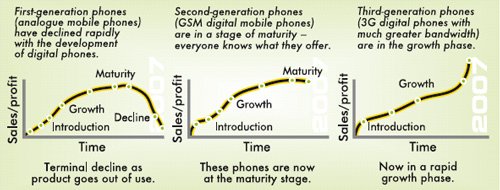3G stands for third-generation mobile communication and can be viewed as wireless broadband for mobile phones. It is a radio communications technology offering:

3G is a contemporary development, with phones first being developed on a major scale in Japan in 2001. Today, more than half of Japanese mobile phone users use 3G. It spread to Europe in 2003 and its use is growing rapidly here and worldwide. The market leader in 3G in this country is 3. 3 has the highest customer base in its market sector. As a mobile network provider, 3 recognised that 3G was the way forward for market development. It seeks to provide the best network available for mobile phone users.
The Product Life Cycle

Products go through a life cycle:
- When a new product is introduced to the market, consumers may have little awareness. Therefore, it is important to use promotional activity to give advice about the product’s benefits.
- The next stage is growth. During this period more people find out about the product and purchase it.
- Finally is a stage of maturity when there is little expansion and a product may go into decline.
The typical life cycle of a product can be illustrated as above. The sales performance rises steadily from zero (when the product is introduced to the market).
The mobile phone market fits this pattern.

Relationship between the life cycle and sales
Initially the product will grow and flourish. However, as new competitors come into the market and as excitement about the product reduces, a new stage in the life cycle stage is reached, called maturity. If the product is not handled carefully at this stage we may see the saturation of the market and interest in the product or services begins to decline. At each stage there is a close relationship between sales and profits so that as organisations or brands go into decline, their profitability decreases. To prolong the life cycle of a brand or product, an organisation needs to use skilful marketing techniques to inject new life into the product.
Maintaining a product’s life
A product’s life cycle may last for a few months or for more than a century. It all depends on how good the product is originally, how easy it is for competitors to emerge, and how good a firm is at keeping its own product relevant and attractive to consumers. Hutchison Whampoa, the company that owns 3, has led the growth of the global 3G market. It has invested heavily in new technology and provides the most comprehensive network for 3G communications.
What is marketing strategy?

Marketing strategy describes how a business meets the requirements of its market.
The marketing strategy must enable a business to deliver its objectives. Markets are made up of customers with wants and needs. Market planners must provide products and services that are better than those which competitors offer. The organisation with the most effective marketing strategy should become the market leader.
Creating a marketing strategy
To create a marketing strategy you must first find out about your environment through market research. Investigation into the 3G market in Japan first indicated that the ‘killer application’ would be video messaging. This has not proved to be the case. For example, Japanese consumers have been far more interested in music downloads. Market research by 3 showed that consumers are interested in the extensive range of 3G phone applications.

Marketing strategy covers all elements of the procedure that an organisation uses to satisfy the market, such as research, promotion and advertising. The marketing strategy must enable a business to deliver its objectives. Hutchison Whampoa’s objective is to be the market leader in providing 3G wireless communications. All aspects of 3’s market plan are tailored to achieving this. For example, the company’s advertising helps customers appreciate the benefits of 3G services and content.
Product and market orientation
Product Orientation
Production and marketing go hand in hand in successful businesses. You can only convince customers that you can meet their needs if you have the products to do so.
3G technology has significantly more bandwidth than 2G technology. More bandwidth means more space for transmitting large amounts of data e.g. videos rather than text. A 3G phone offers up to 384 kilobytes per second when a device is stationary or moving at pedestrian speed. During 2007, 3 will launch a high speed service which will have a target speed of 1.8 Mbytes per second.
There are three main sections of 3’s UK business:

First mover advantage

3 was the first company in Europe to appreciate the opportunities offered by 3G. It invested seriously in this market, hoping to acquire ‘first mover advantage’ by being the first one to develop a specific market. The first mover becomes associated by customers with that expansion. It is then able to be at the leading edge of new developments so its rivals are continually trying to catch up. 3 is always seeking to improve its products and services to maintain its market leading position. In 2006 these included:
- signing an exclusive deal to stream ITV1 ITV’s flagship channel to its 3.75 million customers in the UK (customer numbers in August 2006)
- signing deals with leading handset producers such as Nokia, Motorola and Sony Ericsson to provide handsets to complement the network. A recent example of this is the link with Sony Ericsson’s K610i and K800i Cyber-shot phones
- screening the 2006 World Cup directly on customer mobile phones. This created an all-time high in mobile television usage
- launch of the X Series from 3, which is supported by a commercial link with key Internet service and software providers such as Microsoft, Yahoo, Google, eBay, Skype, Slingbox and Orb. These links will take wireless broadband to the next level, allowing consumers to experience the full Internet experience whilst on the move.
Market orientation

Hutchison Whampoa took a considerable gamble in investing in the 3G network market. At the time it was a relatively untried new technology, but there was considerable support for the development. Britain is a member state of the European Union (EU), which was able to see the advantage of this innovative technology. In 2002 the EU Council wanted telecom network providers to transfer 80% of telecommunications to 3G.
3 is always seeking to improve its products and services to maintain its market leading position.
Existing network providers and new competitors had to bid for licences to operate using this system but the cost of these was extremely high. Because of this, the successful companies were left with only limited funds to invest in the new technologies. However, 3 was determined to lead the field and has invested considerably in this market. Today it is beginning to harvest the benefits.
Achieving market leadership
3 invested £4.4 billion to purchase one of the five licences available from the Government. Since then, 3 has invested heavily in developing its network which was launched on 3rd March 2003 and which today covers 90% of the UK population.

The market is getting stronger all the time. The network is continually being extended and there are new and innovative companies producing the high-quality phones required to access the products and services delivered across the network.When you phone someone using 3, 3G chops up your call into a miniature packet of data, which is coded. This is a highly efficient way of sending information. Using this system of chopping and coding, 3G can deliver large files such as pictures and videos at a much faster speed.
The results of 3’s market research
3’s market research shows that young people like 3G because it enables them to send pictures, view videos and listen to music downloads. It is also popular with business customers and people who work in the media for example, film editors and journalists.
The market research was able to illustrate that 3G provides customers with many benefits including:
- Real-time communication for example, phone calls, e-mails (including large attachments) and faxes. This means that people can be in constant touch.
- High-speed Internet access you can browse the web and download data files and software using your handset wherever you are.
- Access to information for example, watching the World Cup or accessing news bulletins.
- Personal organisers including electronic diaries and lists.
- Global roaming you can access services anywhere in the world (within 3’s sister territories).
- Video conferencing for business people or schools linking with partner schools in other parts of the world.
Asset-led marketing
An asset is something you have possession of. In this case, Hutchison Whampoa owns 3, which is the UK’s market leader in 3G. This provides customers with a much greater range of communications benefits than non-3G offerings.

Asset-led marketing involves using your material goods in the most efficient way the market determines this. Wise marketers know that assets work best when they meet customer needs. Market research is therefore seen as imperative for 3. For example, it showed that ITV1 is a highly popular television channel. Research also revealed that 3’s customers wanted to watch ITV1 on their phones, so the company formed a link with ITV. The consequence is that 3’s network works better to meet customer requirements this is asset-led marketing. Asset-led marketing involves using your material goods in the most efficient way. 3 is continually seeking to improve its network and services. This involves improving:
- the network
- the content available through the network
- links with mobile phone producers
- links with global leaders in internet technology.
Conclusion

3G wireless technology provides an exciting new development in the way people communicate with each other. It enables us to use a much more comprehensive range of communication than previous forms. Because of the greater bandwidth the new technology offers, there are tremendous benefits to be gained by business and private users. Features such as high-speed internet connections and the transmission of pictures and sound give users access to high-quality information wherever they are.
Future development
A major strength of 3 is an emphasis on anticipating and meeting customers’ needs. The company recognises that it can continue to be the market leader only if its product is superior to that of its rivals. This will only be the case if 3 understands what its customers want.
In a fast-moving industry, it is important to find out what clients prefer today, but 3 must also research their future requirements. It must also frequently research new technologies in this way it will stay at the forefront of the field and retain market leadership. 3G is a developing technology and the greatest benefits are likely to come in the next couple of years. Because of its market leadership, 3 is ideally placed to continue to lead developments in 3G.
